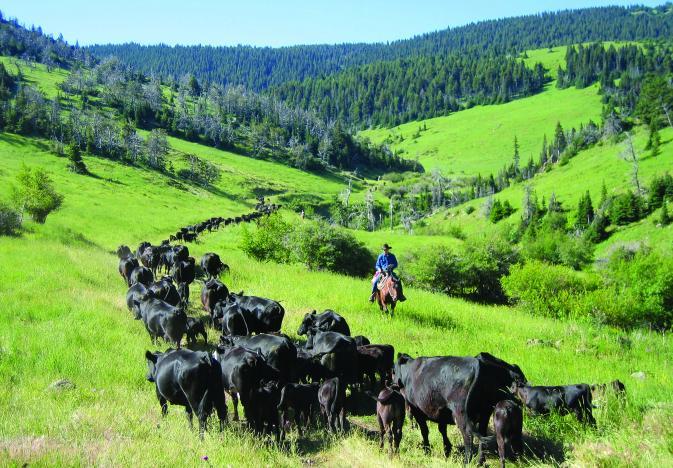Cargill’s Sustainability Pilot Yields +1 Million Pounds Of Beef in 3Q

Cattleman Bob Lowe from Alberta, Canada, says he didn’t change a thing about management at his family cattle operations in order to participate in Cargill’s multistakeholder Canadian Beef Sustainability Acceleration (CBSA) pilot project. “The only new procedure was to submit to a sustainability audit that verifies we do what we say we do”
by Greg Henderson, drovers.com
Cargill says Canadian producers enrolled during the pilot’s third quarter of operation earned credits of $18.52 per head, paid by participating retailers and food service operators.
That’s a significant premium, says Lowe, who operates a 5,000-head feedyard and an 800-head cow-calf operation with his brother. “The long-term average feedyard profits are about $20 per head, so the sustainability credit nearly doubles that.”
“We are doing great things in the beef industry, we just need more openness and transparency about what we are doing”
Cargill launched the CBSA pilot in October 2017, with partners Verified Beef Production Plus (VBP+) and Beef InfoXchange System (BIXS) to create the first supply chain of verified sustainable beef in Canada. The pilot expands on McDonald’s sustainability pilot, which ended in 2016, where the fast food retailer collaborated with Cargill and other supply chain stakeholders to demonstrate the viability of such a program. Cargill is the sole supplier of beef patties to McDonald’s Canada.
The McDonald’s Canadian beef sustainability pilot tracked 9,000 cattle from 121 cow-calf operations, 34 backgrounders and 24 feedlots, becoming the first beef sustainability initiative in the world to bring the Global Roundtable for Sustainable Beef principles and criteria to life.
Both McDonald’s and Cargill say consumers are the reason for their emphasis on sustainability.
“Research tells us consumers want transparency,” says Gurneesh Bhandal, Cargill’s Toronto-based sustainability manager. “Our sustainability work is to help connect producers to consumers and help build trust through greater transparency.”
During the third quarter of its operation, Cargill’s sustainability pilot produced more than 1 million pounds of beef from certified sustainable sources, nearly double the amount produced during the pilot’s first quarter. Cargill says the program has seen a steady increase in participation from cattle producers and food service partners.
Lowe, who currently serves as vice president of the Canadian Cattlemen’s Association, says he’s comfortable with the auditing system and believes producing sustainable beef will benefit the industry.
“People want assurances their food is produced with minimal environmental impact and that the animals are cared for properly,” he says. “They don’t necessarily want details, but they want to trust us, and I think they do trust us. Sustainability programs help farmers and ranchers assure that trust doesn’t erode.”
Bhandal says producers must become a source of information.
“Consumers have access to a lot of information, and it’s not always the right source of information,” she says. “They’re relying on social media and the internet rather than talking to farmers and ranchers directly, which is not always accurate.”
Projects such as Cargill’s sustainability pilot give producers an opportunity to communicate in a positive way how and where cattle are raised.
“Consumers are looking for a positive story about where their food is coming from so that they can feel good about consuming that product,” Bhandal says. “We are doing great things in the beef industry, we just need more openness and transparency about what we are doing.”
Retail and food service partners associated with the pilot project include McDonald’s Canada, Loblaw Companies Limited, the Swiss Chalet Rotisserie and Grill and Original Joe’s restaurant units of Vaughan, Ontario-based Recipe Unlimited Corporation. More recently, British Columbia-based casual dining chain Cactus Club Café became a participating partner.
Those partners pay the pilot project’s per-head credits for qualifying cattle. The credits vary each quarter based on the number of qualifying animals, cattle weights and beef demand from participating retailers and food service operators. During the pilot’s first quarter, credits of $10 per head were paid. Second quarter credits totaled $20.11 per head, with the most recent quarter at $18.52.
Lowe says the pilot shows how valuable retailers and food service companies view sustainability.
“Can retailers and food service companies get those premiums back? It looks like they can,” Lowe says. “This (sustainability verification) is what consumers say they want. We can’t stick our heads in the sand and ignore it if we want to remain in business.”
Certification bodies for Canadian cattle include VBP+, a program comparable to the U.S.-based Beef Quality Assurance (BQA) program, and Where Food Comes From (WFCF), a Denver-based food certification and verification company. Canada’s BIXS registers producers, tracking cattle through the supply chain and processing the credits paid to producers.
Cattle are processed at the Cargill High River, Alberta, facility. Cargill says its Guelph, Ontario, beef processing facility will soon be audited to qualify for the program, and Cargill will engage with the GRSB and the eastern Canada cattle industry to identify ways to increase the volume of certified sustainable beef.
source: drovers.com












